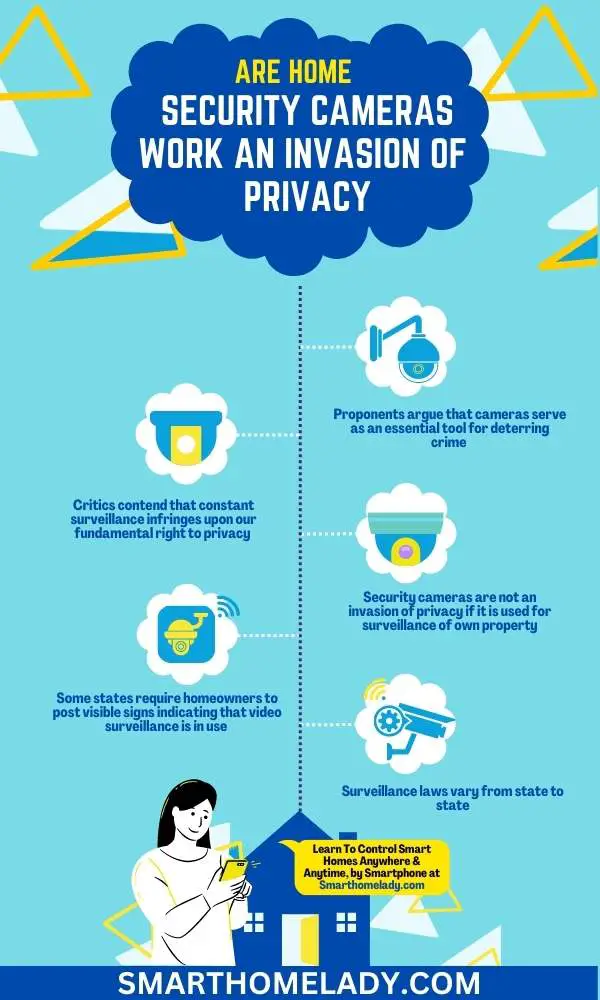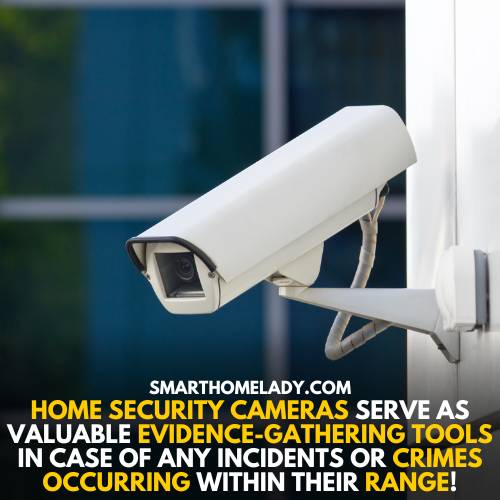As I explored the topic of home security cameras and their potential invasion of privacy, I found myself immersed in a complex web of laws, opinions, and ethical considerations.
It is undeniable that these surveillance devices have become increasingly popular in recent years, promising to protect our homes and loved ones from potential threats.
However, as with any technology that watches us day and night, concerns about privacy naturally arise.
In this article, I will explore the various perspectives surrounding the use of home security cameras. I aim to provide a complete answer to the question: Are home security cameras an invasion of privacy?
So, let’s begin.

Contents
- 1 Do home security cameras invade privacy? Legal Implications
- 2 Why security cameras are not an invasion of privacy?
- 3 What are Privacy Laws on Home Security Cameras?
- 4 Consent laws for home security cameras
- 5 What are the rules for invasion of privacy in Wisconsin – Rules for Privacy
- 6 Public opinion on home security cameras
- 7 Do burglars target houses with cameras?
- 8 Can I install cameras outside my house?
- 9 Can I put cameras in my house without my spouse knowing?
- 10 Conclusion
Do home security cameras invade privacy? Legal Implications
In order to truly understand whether or not home security cameras invade our privacy, it is crucial to examine both sides of the argument.
Argument 1 – Proponents
On one hand, proponents argue that these cameras serve as an essential tool for deterring crime and ensuring the safety of our homes.
They believe that sacrificing some degree of privacy is necessary in exchange for increased security. Security cameras offer peace of mind to homeowners and can help law enforcement solve crimes.
Argument 2 – Critics
On the other hand, critics contend that constant surveillance infringes upon our fundamental right to privacy and creates a society where we are constantly being watched without consent.
Being constantly monitored within the confines of our own homes can make us feel uneasy and violated.
Must Read: Is It Illegal To Tamper With Security Cameras?
Additionally, there are legal implications surrounding the use of these cameras, such as where they’re placed and what they capture.
The societal impact cannot be overlooked either – constant surveillance may lead to a culture of distrust among neighbors or even family members.
Disclaimer – This article is written after doing research from various resources. However, I recommend you consult a lawyer for legal issues as I’m not a lawyer.
These differing viewpoints highlight the need for a thorough examination of laws surrounding home security cameras as well as an exploration of public opinion on this matter.
It’s crucial for individuals and policymakers alike to carefully consider these aspects when deciding on whether or not home security cameras are an invasion of privacy.
Why security cameras are not an invasion of privacy?
Security cameras are not considered an invasion of privacy if it is used for surveillance of own property without violating someone else privacy. As its benefits outweigh its negative impacts.
Home security cameras offer numerous security benefits, such as acting as a deterrent to potential criminals.
Knowing that their actions are being captured on camera can discourage individuals from engaging in illegal activities and trespassing.
Additionally, these cameras allow for remote monitoring, enabling homeowners to keep an eye on their property even when they’re away. This feature provides peace of mind and enhances the overall security of the premises.
Furthermore, home security cameras serve as valuable evidence-gathering tools in case of any incidents or crimes occurring within their range.

The recorded footage can be crucial for identifying perpetrators and aiding in legal proceedings.
So, the presence of home security cameras contributes to a safer environment while respecting personal privacy boundaries, offering both protection and reassurance to homeowners.
Must Read: Can Neighbors Have Security Cameras Towards Your House?
What are Privacy Laws on Home Security Cameras?
Privacy laws in the USA regulate the usage of surveillance cameras within residential premises. These laws aim to strike a balance between ensuring public safety and protecting individuals’ privacy rights.
While there are legal restrictions on video surveillance, homeowners generally have the right to install security cameras on their own property.
However, they must adhere to certain guidelines, such as avoiding areas where a reasonable expectation of privacy exists, such as bathrooms or bedrooms.
Additionally, some states require homeowners to post visible signs indicating that video surveillance is in use.
Surveillance laws vary from state to state, so it’s important for homeowners to familiarize themselves with their local regulations before installing home security cameras.
By having clear home security camera regulations, these privacy laws help ensure that surveillance is used responsibly while maintaining the safety of both individuals and communities.
Must Read: Do You Need A License To Install Security Camera?
Consent laws for home security cameras
To ensure compliance with consent laws for home security cameras, you must be aware of the specific regulations in your state and take necessary steps accordingly.
Using hidden surveillance cameras to capture video footage without obtaining a person’s consent is generally permissible, even when it comes to installing security cameras within the confines of your own home.
However, it is crucial to note that recording individuals without their consent in areas where privacy is expected, such as bedrooms, guest rooms, and bathrooms, is strictly against the law.
It is worth emphasizing that state laws pertaining to video surveillance must align with the Fourth Amendment of the Constitution, which safeguards individuals against unreasonable searches and seizures.
By adhering to these legal boundaries, we can strike a balance between maintaining security and respecting privacy.
In most states, individuals have the right to use video surveillance in private spaces as long as they have the consent of the person being filmed. This consent is typically obtained by entering a location where signs clearly state that surveillance is in operation.
However, it’s worth mentioning that some states, such as Michigan, Delaware, Maine, Tennessee, South Dakota, Utah, Kansas, and New Hampshire, require explicit consent even for hidden cameras.
To ensure compliance with the law, it is highly recommended to familiarize oneself with the local, state, county, and federal regulations pertaining to home security cameras prior to any installation or implementation of surveillance plans.
To make sure you’re following the law, it’s a really good idea to get to know the rules for home security cameras in your area – local, state, county, and federal.
It’s important to do this before you start installing or using any surveillance systems.
What are the rules for invasion of privacy in Wisconsin – Rules for Privacy
If you’re in Wisconsin, it’s crucial that you familiarize yourself with the rules governing invasion of privacy to ensure you don’t inadvertently cross any legal boundaries.
Wisconsin is a one-party consent state when it comes to recording. This means that it is illegal to record or share any wire, oral, or electronic communications without the consent of at least one person involved in the conversation.
So, make sure you have permission before hitting that record button.
By being aware of the privacy laws in Wisconsin and understanding your legal rights, you can ensure that you’re using surveillance cameras within the boundaries set by the law.
Public opinion on home security cameras
People’s feelings towards surveillance cameras in residential areas often vary greatly. There are pros and cons to consider when it comes to the public perception of home security cameras.
On one hand, many people feel safer knowing that their homes are being monitored and that potential criminals may be deterred from targeting their property.
Home security cameras can provide valuable evidence in the event of a crime and help law enforcement solve cases more efficiently.
However, there are also drawbacks to consider. Some individuals view these cameras as an invasion of privacy, feeling uncomfortable with the idea of constant surveillance in their own neighborhoods.
Additionally, there are legal implications surrounding the use of home security cameras, such as adhering to privacy laws and obtaining consent from neighbors if their properties are within range of the camera’s view.
The social impact of home security cameras is also worth considering. While they may increase safety for some, they can also create a sense of paranoia or mistrust among community members.
Must Read: Can You Put A Security Camera On A Telephone Pole?
Frequently Asked Questions FAQs
Do burglars target houses with cameras?
Absolutely not. Burglars are more likely to avoid houses with visible security cameras. These cameras act as a powerful deterrent, making criminals think twice before attempting any illegal activities.
A study conducted by the University of North Carolina found that homes without security cameras were 300% more likely to be targeted by burglars.
By installing cameras, you significantly increase the overall safety and security of your home, making it a less appealing target for potential thieves.
Can I install cameras outside my house?
Yes. Installing cameras outside your house is a fantastic idea to enhance the security of your property.
Outdoor cameras can monitor your front yard, driveway, and other vulnerable areas, providing a comprehensive view of any potential threats.
With advancements in technology, outdoor cameras have become more affordable, user-friendly, and durable.
You can choose from a wide range of options, including wireless cameras that can be easily installed without the need for extensive wiring.
Can I put cameras in my house without my spouse knowing?
While security is essential, open communication is equally important in any relationship. It is always advisable to discuss and gain consent from your spouse before installing cameras in your home.
Transparency and mutual agreement on security measures help maintain trust and privacy within the household.
By involving your spouse in the decision-making process, you can ensure that both of you are on the same page regarding the installation and use of cameras, creating a harmonious and secure environment.
Conclusion
In conclusion, while home security cameras can raise questions about the invasion of privacy. However, when used responsibly within legal frameworks and with proper consideration for individual rights, they can play a valuable role in enhancing home security.
It’s essential for homeowners to carefully navigate the balance between privacy and security, while also being mindful of public opinion and potential concerns.
By doing so, they can mitigate any potential privacy infringements and ensure a safer living environment for themselves and their communities.
Sources
- Recording Laws For Wisconsin (Source Link)
- What do security cameras provide for society? The influence of cameras in public spaces in Japan on perceived neighborhood cohesion and trust. (Source Link)
- Development of security cameras with privacy protection and, social experiments using the security camera with privacy protection. (Source Link)

